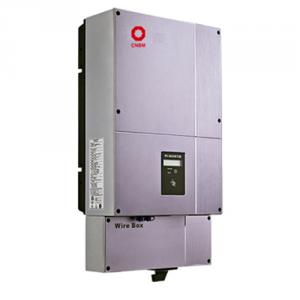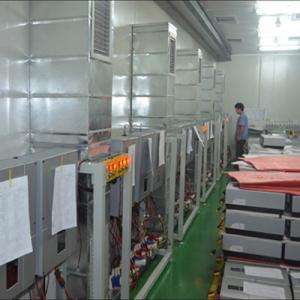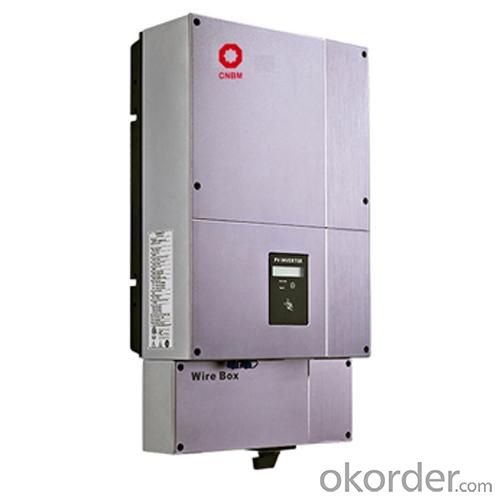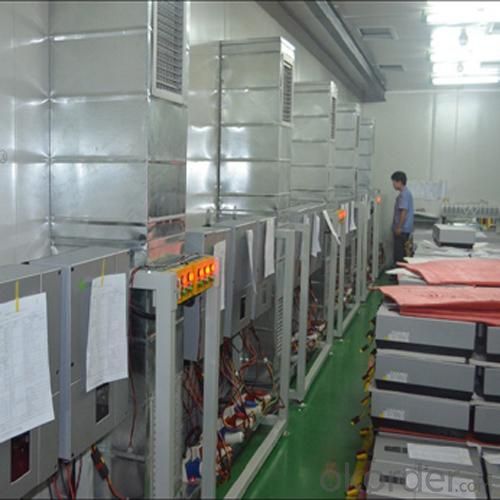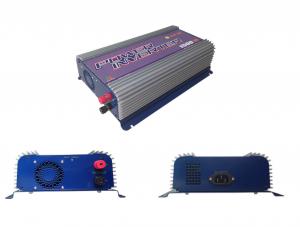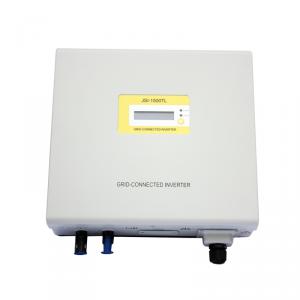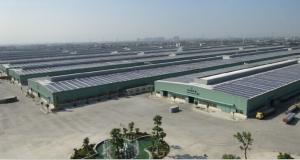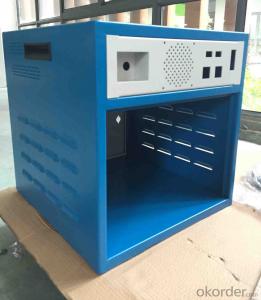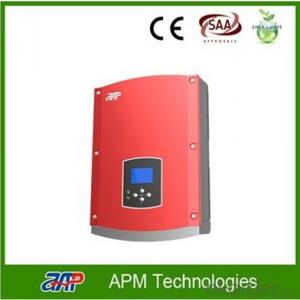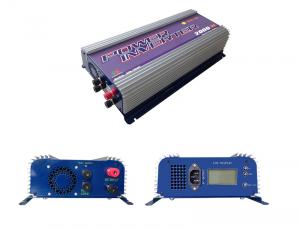100 Kw Grid Connected Solar Inverter 1500W
- Loading Port:
- Shenzhen
- Payment Terms:
- TT or L/C
- Min Order Qty:
- 1 pc
- Supply Capability:
- 3000 sets Per Month pc/month
OKorder Service Pledge
OKorder Financial Service
You Might Also Like
Introduction of Grid Connected Solar Inverter 1500W
CNBM International Corporation (CNBM International) is the most important trading platform of CNBM Group
Corporation, a state-owned company under the direct supervision of State-owned Assets Supervision and Administration
Commission of the State Council. The Grid Connected Solar Inverter we can offer is single-phase
1.5kw-5kw 1&2 MPPT; three-phase 10kw to 20kw 2MPPT inverters. Good quality and good services.
Advantages of Grid Connected Solar Inverter 1500W
Maximum efficiency of 97.5% and wide input voltage range
Integrated DC switch-disconnected
MTL-String
Sound control
Bluetooth/RF technology /Wi-Fi
Transformerless GT topology
5 years warranty (10 years as optional)
Datasheet of Grid Connected Solar Inverter 1500W
Model | CNBM-1500-US | CNBM-2000-US | CNBM-3000-US |
Input data |
| ||
Max. DC power | 1800W | 2300W | 3200W |
Max. DC voltage | 450V | 500V | 500V |
Start voltage | 150V | 150V | 150V |
PV voltage range | 100V-450V | 100V-500V | 100V-500V |
Number of MPP trackers/strings per MPP tracker | 1/1 | 1/2 | 1/2 |
Max. input current of the MPP tracker | 12A | 14A | 17A |
Output data |
| ||
Nominal AC output power | 1500W@208Vac 1650W@240&277Vac | 1800W@208Vac 2000W@240&277Vac | 2500W@208Vac 2800W@240&277Vac |
Max. output current | 8A/7.8A/6.8A | 9.7A/9.4A/8.2A | 15A/14.2A/12.3A |
AC nominal voltage; range | Default:240V single phase optional:208,240or277 single phase 183-228@208V 211-264V@240V 244-305@277V | ||
AC grid frequency; range | 60Hz;59.3-60.5Hz | 60Hz;59.3-60.5Hz | 60Hz;59.3-60.5Hz |
Phase shift (cosφ) | 1 | 1 | 1 |
THDI | <3% | <3% | <3% |
AC connection | Single phase | Single phase | Single phase |
Efficiency |
| ||
Max. efficiency | 97% | 97% | 97% |
CEC efficiency | 96% | 96.50% | 96.50% |
MPPT efficiency | 99.50% | 99.50% | 99.50% |
Protection devices |
| ||
Output overvoltage protection-varistor | yes | yes | yes |
Ground fault monitoring | yes | yes | yes |
Grid monitoring | yes | yes | yes |
General Data |
| ||
Dimensions (W / H / D) in mm | 360/465/165 | 360/465/165 | 360/465/165 |
Weight | 14.6KG | 15.1KG | 15.9KG |
Operating temperature range | -25...+60°C | -25...+60°C | -25...+60°C |
Altitude | Up to 2000m(6560ft) without power derating | ||
Consumption: operating(standby) / night | <5W / < 0.5 W | <5W / < 0.5 W | <5 W / < 0.5 W |
Topology | Transformerless | ||
Cooling concept | Natural | Natural | Natural |
Enclosure | Type 3R | Type 3R | Type 3R |
Features |
| ||
DC connection: | Screw terminal | Screw terminal | Screw terminal |
AC connection: | Screw terminal | Screw terminal | Screw terminal |
display | LCD | LCD | LCD |
Interfaces: RS485/RS232/Bluetooth/RF/Zigbee | yes/yes/opt/opt/opt | ||
Warranty: 5 years/ 10 years / 15 years | yes /opt | yes /opt | yes /opt |
Certificates and approvals | UL1741,UL1998 IEEE 1547, CSA C22.2 No.107.1-1,FCC Part15(Class A&B) | ||
Picture 1: Factory of Grid Connected Solar Inverter 1500W factory
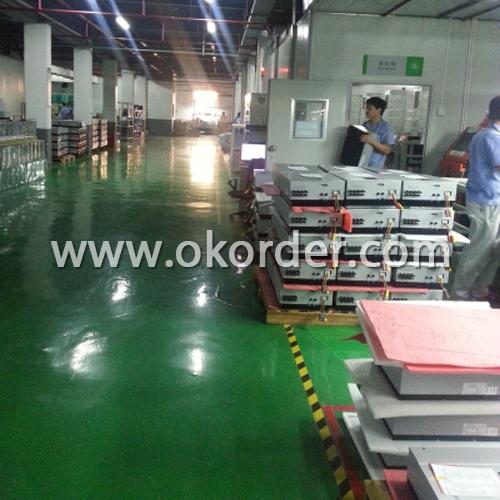
Picture 2: Package of Grid Connected Solar Inverter 1500W
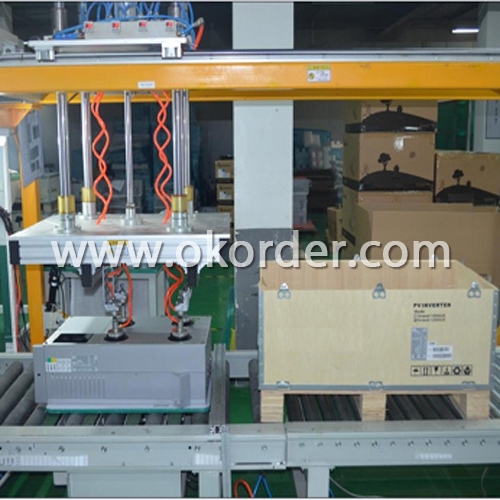
- Q: Are there any government regulations or certifications for solar inverters?
- Yes, there are government regulations and certifications for solar inverters. In many countries, solar inverters must comply with specific standards and regulations set by government bodies. Additionally, various certifications such as International Electrotechnical Commission (IEC) standards, UL listing, and CE marking are commonly required to ensure the safety, performance, and interoperability of solar inverters.
- Q: Can a solar inverter be used for off-grid systems?
- Yes, a solar inverter can be used for off-grid systems. In fact, it is an essential component of off-grid solar systems as it converts the DC (direct current) electricity generated by the solar panels into AC (alternating current) electricity that can be used to power household appliances and other electrical devices.
- Q: Can a solar inverter be used in systems with different module capacities?
- Yes, a solar inverter can be used in systems with different module capacities. Solar inverters are designed to convert the DC power generated by solar panels into AC power that can be used in homes or businesses. They are typically designed to handle a range of module capacities and can be adjusted or configured to accommodate different system sizes. However, it is important to ensure that the inverter's capacity is compatible with the total capacity of the solar panels in the system to ensure optimal performance.
- Q: Can a solar inverter be used with solar-powered air conditioning systems?
- Yes, a solar inverter can be used with solar-powered air conditioning systems. The solar inverter is responsible for converting the direct current (DC) generated by the solar panels into alternating current (AC) that can be used to power various electrical appliances, including air conditioning units. By connecting the solar inverter to the solar panels and the air conditioning system, the generated solar energy can be efficiently utilized to power the AC system.
- Q: Can a solar inverter be used with battery storage?
- Yes, a solar inverter can be used with battery storage. In fact, integrating a solar inverter with battery storage systems allows for storing excess solar energy generated during the day and using it at night or during times of high energy demand. This combination enables greater energy independence and the ability to use renewable energy even when the sun is not shining.
- Q: How does the efficiency of a solar inverter affect the overall system performance?
- The efficiency of a solar inverter plays a crucial role in determining the overall performance of a solar system. A higher efficiency inverter converts a greater percentage of the energy generated by the solar panels into usable electricity. This means that less energy is lost as heat, resulting in more electricity being available for consumption. A more efficient inverter translates into increased energy production, reduced reliance on grid power, and ultimately, higher cost savings. Additionally, a highly efficient inverter enhances the stability and reliability of the system, ensuring optimal performance and longevity.
- Q: Can a solar inverter be installed outdoors?
- Yes, a solar inverter can be installed outdoors. However, it is important to ensure that the inverter is designed to withstand outdoor conditions, such as rain, humidity, and temperature fluctuations. Outdoor installation should also comply with local electrical codes and regulations.
- Q: Can a solar inverter be used with solar-powered electric fences?
- Yes, a solar inverter can be used with solar-powered electric fences. Solar inverters are used to convert the direct current (DC) produced by solar panels into alternating current (AC) that can be used to power various electrical devices, including electric fences. By connecting a solar inverter to the solar panels of a solar-powered electric fence system, the DC power generated by the panels can be converted into the AC power required to operate the electric fence.
- Q: Can a solar inverter be used with different types of mounting systems?
- Yes, a solar inverter can be used with different types of mounting systems. The compatibility of the inverter with different mounting systems depends on factors such as the voltage and power requirements, as well as the communication protocols. However, most modern solar inverters are designed to be versatile and can be used with various types of mounting systems, including roof-mounted, ground-mounted, and pole-mounted systems.
- Q: Can a solar inverter be used in systems with different module voltages?
- Yes, a solar inverter can be used in systems with different module voltages. Solar inverters are designed to convert the direct current (DC) generated by solar panels into alternating current (AC) that can be used in the electrical grid or for powering appliances. They are equipped with maximum power point tracking (MPPT) technology, which allows them to adjust and optimize the voltage and current output to match the specific voltage requirements of the solar panels. This flexibility enables solar inverters to work efficiently with various module voltages, making them compatible with different solar system configurations.
Send your message to us
100 Kw Grid Connected Solar Inverter 1500W
- Loading Port:
- Shenzhen
- Payment Terms:
- TT or L/C
- Min Order Qty:
- 1 pc
- Supply Capability:
- 3000 sets Per Month pc/month
OKorder Service Pledge
OKorder Financial Service
Similar products
Hot products
Hot Searches
Related keywords

